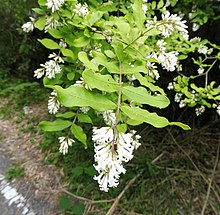Ligustrum obtusifolium (border privet[1] or Amur privet[2]) is a species of privet, native to Japan, Korea and northeastern China (Heilongjiang, Jiangsu, Liaoning, Shandong, Zhejiang).[3][4] The species is considered invasive in parts of the United States. It has become very common in southern New England, the mid-Atlantic States, and the Great Lakes regions, with scattered occurrences in the South, the Great Plains, and Washington state.[5][6] With Ligustrum ovalifolium it is a parent of the widespread hybrid Ligustrum × ibolium.[7]
| Ligustrum obtusifolium | |
|---|---|

| |
| Scientific classification | |
| Kingdom: | Plantae |
| Clade: | Tracheophytes |
| Clade: | Angiosperms |
| Clade: | Eudicots |
| Clade: | Asterids |
| Order: | Lamiales |
| Family: | Oleaceae |
| Genus: | Ligustrum |
| Species: | L. obtusifolium
|
| Binomial name | |
| Ligustrum obtusifolium | |
| Synonyms | |
|
Ligustrum amurense Carrière | |
Ligustrum obtusifolium is a deciduous shrub growing to 3 metres (9.8 ft) tall. The leaves are 1 to 6 centimetres (0.39 to 2.36 in) long and 4 to 25 millimetres (0.16 to 0.98 in) broad.[3][8]
There are three subspecies:[3]
Etymology
editLigustrum means ‘binder’. It was named by Pliny and Virgil.[9]
References
edit- ^ USDA, NRCS (n.d.). "Ligustrum obtusifolium". The PLANTS Database (plants.usda.gov). Greensboro, North Carolina: National Plant Data Team. Retrieved 3 June 2015.
- ^ USDA, NRCS (n.d.). "Ligustrum amurense". The PLANTS Database (plants.usda.gov). Greensboro, North Carolina: National Plant Data Team. Retrieved 3 June 2015.
- ^ a b c Flora of China: Ligustrum obtusifolium
- ^ Kew World Checklist of Selected Plant Families, Ligustrum obtusifolium
- ^ Swearingen, Jil; Reshetiloff, K.; Slattery, B; Zwicker, S. (2010). Plant Invaders of Mid-Atlantic Natural Areas, 4th Edition (PDF). National Park Service and U.S. Fish & Wildlife Service. p. 71.
- ^ Biota of North America Program, Ligustrum obtusifolium
- ^ "Ligustrum × ibolium". Plant Finder. Missouri Botanical Garden. Retrieved 6 December 2020.
- ^ Siebold, Philipp Franz von & Zuccarini, Joseph Gerhard. 1846. Abhandlungen der Mathematisch-Physikalischen Classe der Königlich Bayerischen Akademie der Wissenschaften 4(3): 168
- ^ Gledhill, David (2008). "The Names of Plants". Cambridge University Press. ISBN 9780521866453 (hardback), ISBN 9780521685535 (paperback). p 237